Marcia Thornton Jones's Blog, page 157
February 3, 2016
On Groundhogs, Hibernation & the Creative Life
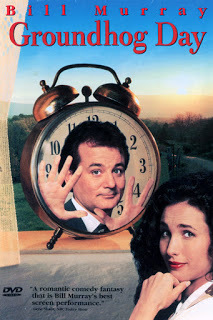 Last year – 2015 – I took a break. Not a break from writing, a break from school visits/presentations/etc. I decided to hibernate.
Last year – 2015 – I took a break. Not a break from writing, a break from school visits/presentations/etc. I decided to hibernate.There were lots of reasons for this. Mostly, it was a way to reconnect with my truest self: I'm a quiet, introverted person. I am much more comfortable anonymous in a crowd than on a stage. I enjoy time with my family, time alone, and time feeding my creative spirit.
It was a very good year. One of the best ever. I wrote – and sold – three new books. I traveled to Europe. I learned to play the cello. I cooked beautiful meals. And so much more! THIS is how I want to live, I said to myself again and again. Writing. Not talking about writing. WRITING.
And while I am doing the opposite of hibernate this year as I deliver two new books to the world, I am still carrying with me some of that serenity. I am enjoying my time connecting with readers in a less-stressed way. And I am still writing, though not nearly so much.
Which brings me to that famous groundhog. In the movie GROUNDHOG'S DAY, the Bill Murray character relives the same day over and over until he finally gets it right. O the poetry of repetition!
The groundhog hibernates and comes out again every single year. Not a one-time occurrence, or a full-time occurrence. Seasonal. For whatever reason, this brings me comfort. Last year was a season of hibernation for me. This year is a season of public activity. Neither is forever, and I will get back to each of them in due time.
My creative life continues to be nourished by new habits and revelations I picked up when I participated in THE ARTIST'S WAY group last year. I've spent far too much of my creative life in the past focused on the end-product. These days I am attached to this idea of myself as always beginning – kind of like Bill Murray in the movie. Even hibernation is a way to begin.
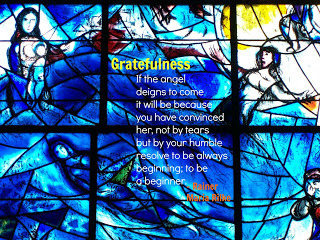
Irene Latham is a poet and novelist from Birmingham, Alabama. Her books for children include Leaving Gee's Bend, Don't Feed the Boy, Dear Wandering Wildebeest, and two new poetry collections When the Sun Shines On Antarctica and Fresh Delicious: Poems from the Farmers' Market. She's grateful for the ever-changing writing seasons. irenelatham.com
Published on February 03, 2016 03:30
February 1, 2016
SMACK DAB NEWS!
Put on your ice boots and parkas and get your penguin fix with WHEN THE SUN SHINES ON ANTARCTICA: And Other Poems about the Frozen Continent by Irene Latham & Anna Wadham! Now available!
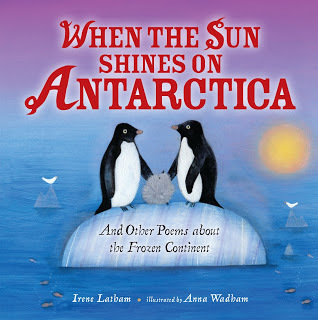
To celebrate, the Antarctica Explorer's Club now accepting new members! Apply (for FREE) membership today!

To celebrate, the Antarctica Explorer's Club now accepting new members! Apply (for FREE) membership today!
Published on February 01, 2016 03:00
January 28, 2016
HAPPY BIRTHDAY WORDQUAKE! (HOLLY SCHINDLER)
My first short story for young readers is officially live!
WordquakeOr: The Day Izzy Ashby Removed All the Words from Her Entire School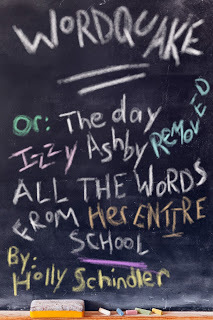
Do you honestly need me to tell you anything else?
Fourth grader Izzy Ashby has literally shaken every single word out of its rightful place in each textbook, worksheet, and bulletin board throughout Eastwood Elementary. And it’s a complete disaster. Seriously…
Wordquake offers an imaginative, action-driven short story that's a perfect fit for teachers searching for a new classroom read-aloud--especially well-suited for reluctant readers.
Grab a copy:
Amazon
iBooks
Kobo
Coming soon to B&N
Enjoy!
--Holly
WordquakeOr: The Day Izzy Ashby Removed All the Words from Her Entire School

Do you honestly need me to tell you anything else?
Fourth grader Izzy Ashby has literally shaken every single word out of its rightful place in each textbook, worksheet, and bulletin board throughout Eastwood Elementary. And it’s a complete disaster. Seriously…
Wordquake offers an imaginative, action-driven short story that's a perfect fit for teachers searching for a new classroom read-aloud--especially well-suited for reluctant readers.
Grab a copy:
Amazon
iBooks
Kobo
Coming soon to B&N
Enjoy!
--Holly
Published on January 28, 2016 05:00
January 22, 2016
Developing Metaphorical Muscle: Smack Dab in the Classroom by Dia Calhoun
January. January Darkness. Days that are squeaks of light. We might think this is the time to read about light. And of course it is. But it's also the time for us all, kids and adults, to read about darkness, if only to endure it better by understand its metaphorical role in our inner world.
Two of my favorite books about this are still the classics: A Wrinkle in Time by Madeline L'Engle (a wonderful new audio recording came out in 2012) and The Dark is Rising by Susan Cooper. Also beloved is the lesser known The Perilous Gard (Newbery Honor 1975) by Elizabeth Marie Pope, who was one of my professors at Mills College. Finally, The Invention of Hugo Cabret by Brian Selznick, which inspired the movie Hugo.
Have kids read one of these books and write about the dark and light on all levels--in the outer world, the inner world, the moral world, the mythological world. Use this to teach them about metaphor. Sadly today, with all the emphasis on the science, math, and technology, kids aren't developing their metaphorical understanding muscles. This is a loss, because metaphor--through dream, religion, mythology, poetry--will help them understand their connection to life. and their place in the world.
Two of my favorite books about this are still the classics: A Wrinkle in Time by Madeline L'Engle (a wonderful new audio recording came out in 2012) and The Dark is Rising by Susan Cooper. Also beloved is the lesser known The Perilous Gard (Newbery Honor 1975) by Elizabeth Marie Pope, who was one of my professors at Mills College. Finally, The Invention of Hugo Cabret by Brian Selznick, which inspired the movie Hugo.
Have kids read one of these books and write about the dark and light on all levels--in the outer world, the inner world, the moral world, the mythological world. Use this to teach them about metaphor. Sadly today, with all the emphasis on the science, math, and technology, kids aren't developing their metaphorical understanding muscles. This is a loss, because metaphor--through dream, religion, mythology, poetry--will help them understand their connection to life. and their place in the world.
Published on January 22, 2016 22:00
“INSPIRATION EXISTS, BUT IT HAS TO FIND YOU WORKING,” by Laurie Calkhoven (and Pablo Picasso)
It took me a long time to learn the truth of the Pablo Picasso quote in the headline. I was one of those people who often said, “One day, I’m going to be a writer.” I wrote fiction all through grade school and high school. I majored in journalism in college, but that’s not really what I wanted to do. I wanted to write novels.
I went to work in book publishing and spent twenty years helping other people bring their books into the world. I was always going to write “one day.” What I was really waiting for was the idea that would transform me into a writer, the Eureka moment that in which I would become the next Anne Tyler, the next Alice Hoffman. Twenty years of not writing anything more than reports and memos—waiting for an idea. I told myself that when the time was right, it would happen.
Of course it didn’t.
One day I was expressing that wish to a trusted friend. She pointed me toward Julia Cameron’s THE ARTIST’S WAY, a twelve week program to “awaken your creative soul.” One of the most important exercises in that program was to write Morning Pages—three longhand pages about anything that comes to mind, first thing every morning.
I loved Morning Pages. First I thought of them as a brain drain where I scribbled about the dreams that I had woken up with, the difficult meeting to come at work that day, the book I was reading, my argument with my sister. But pretty soon, I was finding the seeds of short essays. And then a fiction idea –the first one like a BANG while I was reading the newspaper one morning. And then I discovered I was a children’s writer! Who knew?
I got to work on my first novel, made a career switch to children’s publishing, and four years later left the corporate world behind to be a full-time writer.
After twenty years of sitting around waiting for an epiphany, I learned that all I had to do was show up on the page. “Inspiration exists, but it has to find you working.”
I went to work in book publishing and spent twenty years helping other people bring their books into the world. I was always going to write “one day.” What I was really waiting for was the idea that would transform me into a writer, the Eureka moment that in which I would become the next Anne Tyler, the next Alice Hoffman. Twenty years of not writing anything more than reports and memos—waiting for an idea. I told myself that when the time was right, it would happen.
Of course it didn’t.
One day I was expressing that wish to a trusted friend. She pointed me toward Julia Cameron’s THE ARTIST’S WAY, a twelve week program to “awaken your creative soul.” One of the most important exercises in that program was to write Morning Pages—three longhand pages about anything that comes to mind, first thing every morning.
I loved Morning Pages. First I thought of them as a brain drain where I scribbled about the dreams that I had woken up with, the difficult meeting to come at work that day, the book I was reading, my argument with my sister. But pretty soon, I was finding the seeds of short essays. And then a fiction idea –the first one like a BANG while I was reading the newspaper one morning. And then I discovered I was a children’s writer! Who knew?
I got to work on my first novel, made a career switch to children’s publishing, and four years later left the corporate world behind to be a full-time writer.
After twenty years of sitting around waiting for an epiphany, I learned that all I had to do was show up on the page. “Inspiration exists, but it has to find you working.”
Published on January 22, 2016 00:30
January 19, 2016
Epiphany (January theme) by Kristin Levine
A few years ago, I was getting divorced. The paperwork had been completed with a mediator, but I had been advised to hire a lawyer to review our settlement agreement to make sure everything was clear and fair.
I made an appointment, and when I walked into the law office, I found the lawyer was a woman about my own age. She had a beautiful stylish haircut, manicured nails and lovely shoes without a scuff on them. I suddenly felt self-conscious about my own uncolored roots, chewed nails, and the old pumps from 1992.
She led me into her tidy office full of shiny, new furniture and offered me a bottle of water from the fridge. We made small talk. Her au pair was picking up her kids today; I had been an au pair many year ago. As we talked, I thought about my old laptop, piles of papers, and file cabinet I had rescued from the side of the road that made up my “office” at home. I recalled trying to work while my kids played or watched TV.
And as she went to work, reading and examining the papers I had brought along, I found myself consumed with envy. This could have been my life!! I could have been a lawyer. I could have had the beautiful clothes and the fancy office and the nanny to help take care of my kids. Why had I decided to become a writer?! Of all the stupid decisions I had made, this was surely one of the worst.
Half an hour or so later, she was done with the review. Everything was in order. I thanked her for her time and stood to go.
“Wait,” she called after me.
I turned around to look at her. She looked kind of wistful.
“You did say you were a writer, right?” she asked. Before I could nod, she went on. “Because that is so cool!!”
And suddenly, I saw everything differently. She envied me! Maybe she didn’t want to spend hours in a salon, getting her hair and nails done each week, but felt she had to maintain a certain appearance for the firm. She was stuck in this office, all day, everyday, while I could work when and where I wanted. In a cafe. At the library. At home in my pajamas. I had the freedom to imagine stories that I wanted to tell, that were meaningful and important to me. Her days were filled with paperwork, the sad stories of the end of people’s marriages. Maybe she wanted to be the one to pick up the kids from the bus stop.
We looked at each other for a moment and smiled. I told her the names of my books, gave her a card in case she wanted to go to the library and check one out. If we had met in a different manner, I think we would have been friends. I thanked her again and walked out grateful, not only for the legal advice, but for the change in perspective, the realization that we both saw the good in each other lives.
I think this is one of the most important things good writing does for us - it allows us, for a few moments at least, to see the world from someone else’s point-of-view.
I made an appointment, and when I walked into the law office, I found the lawyer was a woman about my own age. She had a beautiful stylish haircut, manicured nails and lovely shoes without a scuff on them. I suddenly felt self-conscious about my own uncolored roots, chewed nails, and the old pumps from 1992.
She led me into her tidy office full of shiny, new furniture and offered me a bottle of water from the fridge. We made small talk. Her au pair was picking up her kids today; I had been an au pair many year ago. As we talked, I thought about my old laptop, piles of papers, and file cabinet I had rescued from the side of the road that made up my “office” at home. I recalled trying to work while my kids played or watched TV.
And as she went to work, reading and examining the papers I had brought along, I found myself consumed with envy. This could have been my life!! I could have been a lawyer. I could have had the beautiful clothes and the fancy office and the nanny to help take care of my kids. Why had I decided to become a writer?! Of all the stupid decisions I had made, this was surely one of the worst.
Half an hour or so later, she was done with the review. Everything was in order. I thanked her for her time and stood to go.
“Wait,” she called after me.
I turned around to look at her. She looked kind of wistful.
“You did say you were a writer, right?” she asked. Before I could nod, she went on. “Because that is so cool!!”
And suddenly, I saw everything differently. She envied me! Maybe she didn’t want to spend hours in a salon, getting her hair and nails done each week, but felt she had to maintain a certain appearance for the firm. She was stuck in this office, all day, everyday, while I could work when and where I wanted. In a cafe. At the library. At home in my pajamas. I had the freedom to imagine stories that I wanted to tell, that were meaningful and important to me. Her days were filled with paperwork, the sad stories of the end of people’s marriages. Maybe she wanted to be the one to pick up the kids from the bus stop.
We looked at each other for a moment and smiled. I told her the names of my books, gave her a card in case she wanted to go to the library and check one out. If we had met in a different manner, I think we would have been friends. I thanked her again and walked out grateful, not only for the legal advice, but for the change in perspective, the realization that we both saw the good in each other lives.
I think this is one of the most important things good writing does for us - it allows us, for a few moments at least, to see the world from someone else’s point-of-view.
Published on January 19, 2016 14:20
January 18, 2016
"The Moral of the Story" (January theme) by Claudia Mills
One of the most common faults in children's literature has been that it's didactic and moralistic, bent on preaching, bent on teaching. For this reason I've heard many brilliantly successful writers caution against any kind of message-driven fiction. Authors should write to tell a whopping good story. Period. Forget about offering a message or a moral. As Samuel Goldwyn quips, "If you want to send a message, call Western Union."
With all due respect, I beg to differ.
As a reader, I've always loved best the protagonist's epiphany moment, that place toward the end of the story when she finally "gets it," figures out some truth about her own experience, about the human condition more generally, which allows her to take one small, halting step toward growing up. That's the moment when I get tears in my eyes. I don't read to find out what happens as much as to find out what it all means. That's the moment that matters most to me as a writer, as well.
So how do we offer epiphanies to our readers in a way that doesn't resort to mere preaching and teaching? Let me offer a stab at some tentative guidelines.While we can find examples of wonderful books by amazing authors that violate all of them, here are three I try to adhere to myself as I craft a story that climaxes with my character discovering some universal truth that changes her, and perhaps the reader, forever.
1. Your character should discover this truth herself rather have it delivered to her through the pronouncements of some adult authority. Let it be hard won, and let her have the honor and glory of the winning.
2. This truth should emerge from the story in an organic way rather than feeling imposed upon it. Don't write the book to tell the message, write the book to find the message.
3. Finally, and most important, it should be (even, and especially, in a book for children) an interesting truth, a complex and surprising truth, not something morally obvious and simplistic like "Don't lie" or "It's nice to share" or "Recyling helps the earth."
I value fiction most when it teaches me something I'm in need - perhaps in desperate need - of knowing. And so I try to let my characters uncover truths that I myself am most in need of discovering.
With all due respect, I beg to differ.
As a reader, I've always loved best the protagonist's epiphany moment, that place toward the end of the story when she finally "gets it," figures out some truth about her own experience, about the human condition more generally, which allows her to take one small, halting step toward growing up. That's the moment when I get tears in my eyes. I don't read to find out what happens as much as to find out what it all means. That's the moment that matters most to me as a writer, as well.
So how do we offer epiphanies to our readers in a way that doesn't resort to mere preaching and teaching? Let me offer a stab at some tentative guidelines.While we can find examples of wonderful books by amazing authors that violate all of them, here are three I try to adhere to myself as I craft a story that climaxes with my character discovering some universal truth that changes her, and perhaps the reader, forever.
1. Your character should discover this truth herself rather have it delivered to her through the pronouncements of some adult authority. Let it be hard won, and let her have the honor and glory of the winning.
2. This truth should emerge from the story in an organic way rather than feeling imposed upon it. Don't write the book to tell the message, write the book to find the message.
3. Finally, and most important, it should be (even, and especially, in a book for children) an interesting truth, a complex and surprising truth, not something morally obvious and simplistic like "Don't lie" or "It's nice to share" or "Recyling helps the earth."
I value fiction most when it teaches me something I'm in need - perhaps in desperate need - of knowing. And so I try to let my characters uncover truths that I myself am most in need of discovering.
Published on January 18, 2016 05:00
January 17, 2016
Epiphany Haiku (January Theme - Sarah Dooley)
11th Hour Epiphany
Seven hours spentstaring at an empty screen.Just before sleep, BAM!
Epiphany Regarding Plot
This is boring, Ishould make something happen soon.Hey, where'd that come from?
Lack of Epiphany
"Why did the author ..."Who knows? No coffee that day.Your answer sounds good.
First Line Epiphany
The clouds just partedand a beam of sun shone downon my empty page.
Last Line Epiphany
I know how it ends!Now to figure a way to get from here to there.
One Last, Proud Haiku
I can't believe Ispelled the word epiphanyright so many times.
Seven hours spentstaring at an empty screen.Just before sleep, BAM!
Epiphany Regarding Plot
This is boring, Ishould make something happen soon.Hey, where'd that come from?
Lack of Epiphany
"Why did the author ..."Who knows? No coffee that day.Your answer sounds good.
First Line Epiphany
The clouds just partedand a beam of sun shone downon my empty page.
Last Line Epiphany
I know how it ends!Now to figure a way to get from here to there.
One Last, Proud Haiku
I can't believe Ispelled the word epiphanyright so many times.
Published on January 17, 2016 17:43
January 14, 2016
Epiphanies (January Theme) by Bob Krech
My top 10 writing epiphanies over the years:
1. You don't have to know the ending before you begin.
2. You don't have to take writing courses or have a degree in writing to be a writer.
3. Not every editor or agent will want to get behind your work, but all you need is one.
4. As the author, you usually know best about your story.
5. On the other hand, you need to listen to and seriously consider other opinions.
6. Rewriting can be fun and maybe the most important part of the process.
7. Listen to your characters. Give them room to lead the way.
8. Leaving a story alone for a few weeks or even months really does give you perspective.
9. You don't need long, uninterrupted hours of time to write. It can be done in chunks.
10. You have to deliberately make time for writing, but also realize there are some things that are more important (family, relationships) and will always take precedence. Don't feel guilty.
1. You don't have to know the ending before you begin.
2. You don't have to take writing courses or have a degree in writing to be a writer.
3. Not every editor or agent will want to get behind your work, but all you need is one.
4. As the author, you usually know best about your story.
5. On the other hand, you need to listen to and seriously consider other opinions.
6. Rewriting can be fun and maybe the most important part of the process.
7. Listen to your characters. Give them room to lead the way.
8. Leaving a story alone for a few weeks or even months really does give you perspective.
9. You don't need long, uninterrupted hours of time to write. It can be done in chunks.
10. You have to deliberately make time for writing, but also realize there are some things that are more important (family, relationships) and will always take precedence. Don't feel guilty.
Published on January 14, 2016 23:30
Gifts to Ourselves, January Theme by Tamera Wissinger
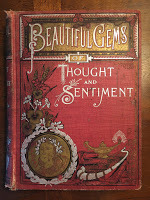 Just after the holidays I put away the decorations and began tidying up around the house. Soon I was deep cleaning all of the bookcases. It’s not the most exciting job, but I do enjoy “visiting” my books and keepsakes. This time around the book that caught my attention was BEAUTIFUL GEMS OF THOUGHT AND SENTIMENT. This version has a 1901 copyright and was printed by C.W. Stanton Company, Chicago. I believe it was edited by Henry Davenport Northrop since he’s credited with editing the 1890 version with the same title. This is mostly a poetry anthology broken into sections like THE CHARMS OF NATURE, DESCRIPTIONS AND TALES OF THE SEA, ALBUM OF LOVE, THE SWORD AND THE PLOW. I love it for the poetry and for the way it freezes time and invites a look backward.
Just after the holidays I put away the decorations and began tidying up around the house. Soon I was deep cleaning all of the bookcases. It’s not the most exciting job, but I do enjoy “visiting” my books and keepsakes. This time around the book that caught my attention was BEAUTIFUL GEMS OF THOUGHT AND SENTIMENT. This version has a 1901 copyright and was printed by C.W. Stanton Company, Chicago. I believe it was edited by Henry Davenport Northrop since he’s credited with editing the 1890 version with the same title. This is mostly a poetry anthology broken into sections like THE CHARMS OF NATURE, DESCRIPTIONS AND TALES OF THE SEA, ALBUM OF LOVE, THE SWORD AND THE PLOW. I love it for the poetry and for the way it freezes time and invites a look backward.This time, though, when I opened the pages I noticed something new. Here tucked inside was a message from the book’s original owner:
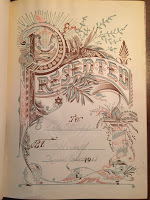 These words:
These words:Presented To: Leta ElCrepps By: Herself Xmas, Dec, 25, 1901
sent a small tingle up my arms and to my heart. In 1901 sweet Leta gave herself a Christmas present. I haven’t been able to find out any information on Leta ElCrepps, nor am I even certain that’s the correct spelling of her name. But what a gift! This book is over 500 pages, with silver and gold pressed into the cover. I imagine in 1901 a book like this would have been a splurge. Why would Leta have done that for herself? Was she a poet? A student? A romantic? I may never know, but what I believe is that Leta cared for herself enough to give herself a marvelous Christmas present.
And now 115 years later Leta’s note and present to herself are a gift to me – my first 2016 epiphany: Remember to treat yourself. It’s a practice that I’d like to adopt in 2016.
Presented to: Tamera Wissinger By: Herself New Year, January 14, 2016
…that has a nice ring.
Wishing you a blessed and gift-filled New Year. (And hello from the past if you are a poet reading this 115 years from now in 2131. Go buy yourself a present; Leta and Tamera said it's okay.)
~~~~~
Tamera Wissinger writes stories and poetry for children including Gone Fishing: A Novel in Verse, This Old Band, and There Was An Old Lady Who Gobbled a Skink (out next month!) and Gone Camping: A Novel in Verse (arriving next year!) You can connect with Tamera online at her website, on Twitter, or on Facebook.
Published on January 14, 2016 05:00



